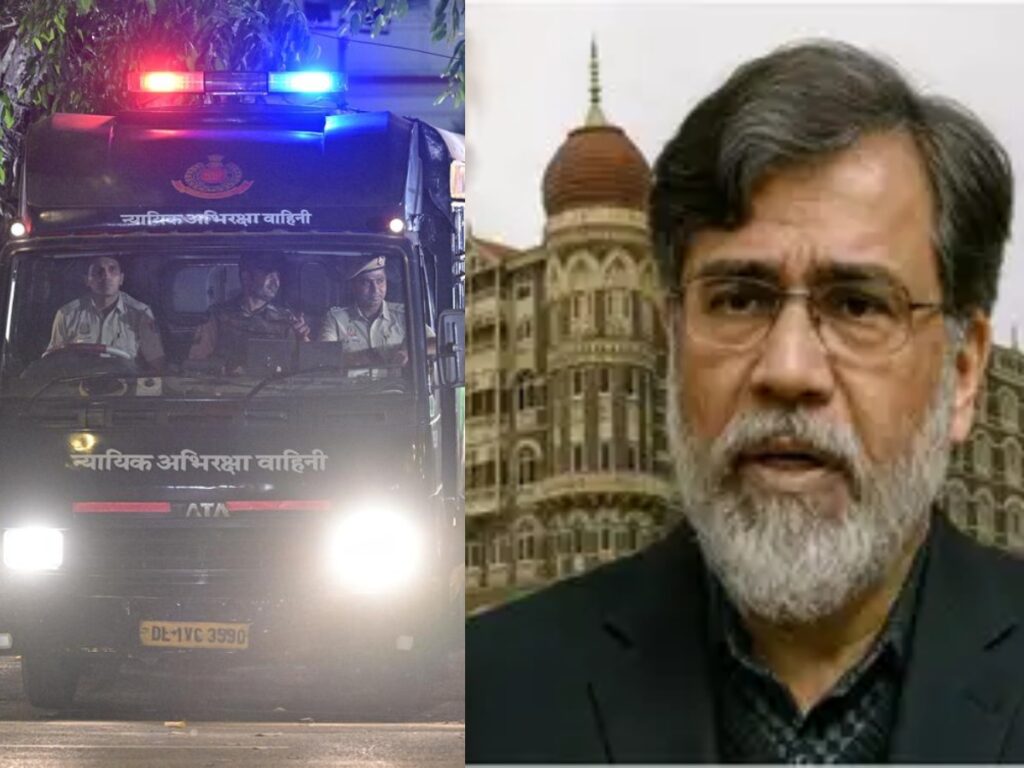In a major development in the 26/11 Mumbai terror attack case, a Delhi court on Friday sent Tahawwur Hussain Rana—an accused conspirator and close associate of David Coleman Headley—to 18-day National Investigation Agency (NIA) custody following his extradition from the United States.
Rana, a Canadian businessman of Pakistani origin, is believed to have played a key role in the planning and logistics of the 2008 Mumbai attacks, which left 166 dead and over 230 injured. His extradition marks a significant milestone in India’s quest for justice in one of the deadliest terror attacks on its soil.
Tight Security as Rana Arrives in Delhi
Tahawwur Rana landed at Indira Gandhi International Airport on April 10 under the supervision of U.S. authorities and Indian security agencies. Soon after his arrival, he was presented before Special NIA Judge Chander Jit Singh at the Patiala House Courts, escorted in a high-security convoy including a prison van, an armored SWAT vehicle, and an ambulance. The courtroom was vacated of mediapersons and the public due to security concerns. Only court staff and essential personnel were allowed in as Rana was formally placed under arrest.
The NIA, which had sought 20 days of custody, cited the need for intensive interrogation to uncover deeper links in the 26/11 conspiracy. The court granted 18 days, during which Rana will be questioned inside a specially prepared high-security cell at NIA headquarters.
Senior Advocate Dayan Krishnan represented the NIA, while advocate Piyush Sachdeva from the Delhi Legal Services Authority appeared for Rana.
A 12-member elite NIA team, led by Director General Sadanand Date, will be involved in Rana’s interrogation. Investigators plan to confront him with extensive evidence, including email trails, voice recordings, photos, and videos—many of which are believed to connect him directly to Pakistan’s ISI and Lashkar-e-Taiba operatives.
Rana’s extradition to India is the result of a prolonged legal battle and diplomatic effort. India pressed the case under the 1997 India-U.S. Extradition Treaty, and after a series of appeals and delays, the U.S. Supreme Court finally rejected his plea for a stay earlier this month. Rana’s legal team argued that his extradition could violate the UN Convention Against Torture, citing his Pakistani-Muslim identity and the political nature of the charges. However, the U.S. judiciary found no merit in the arguments.
Pakistan Distances Itself as Investigations Deepen
In a striking move, Pakistan’s Foreign Office issued a statement on April 10 claiming that Rana had not renewed any Pakistani documentation in the last 20 years and reaffirmed that he is a Canadian national. Indian intelligence officials view this disavowal as a sign of concern within Pakistan’s establishment.
“Pakistan fears Rana will spill the beans,” a senior Indian counter-terror official noted. “His testimony could expose the ISI’s covert role in 26/11.” Rana is expected to provide critical insight into the operational blueprint of the attacks, especially his collaboration with David Headley, who had surveyed multiple sites in Mumbai ahead of the strike.
What Happens Next? Trial and Further Investigations
With Rana in Indian custody, authorities are preparing for a high-profile trial under the NIA Act and the Bharatiya Nagarik Suraksha Sanhita (BNSS). The Centre has appointed Advocate Narender Mann as the special public prosecutor to oversee proceedings in the NIA Special Court and appellate courts.
Both Mumbai’s Arthur Road Jail and Delhi’s Tihar Jail are being considered for Rana’s eventual incarceration post-custody. Jail authorities have been instructed to prepare maximum-security cells for the high-risk detainee.
Why Rana Matters in the 26/11 Probe
Tahawwur Rana’s involvement in the Mumbai attacks was not peripheral. While he was acquitted by a U.S. court of direct involvement in the 26/11 carnage, he was convicted for a separate plot to bomb the Danish newspaper Jyllands-Posten. His close association with David Headley, who operated under the orders of LeT chief Hafiz Saeed, is well-documented.
According to Indian investigators, Rana visited several cities—Delhi, Kochi, Ahmedabad, and Mumbai—alongside his wife in the days preceding the attacks. These visits are now believed to have been part of a broader reconnaissance operation.
International Response and Political Commentary
Israel was among the first to applaud the extradition. “We thank the Government of India for its persistence in bringing the terrorists to justice,” said Israeli Ambassador to India, Reuven Azar.
However, back home, the development sparked political sparring. The Congress accused the Modi government of “rushing to take credit” for a process that had been initiated and pushed forward during the previous UPA regime in coordination with the U.S.
Stay tuned to get more updates!


